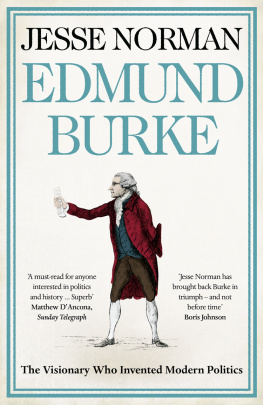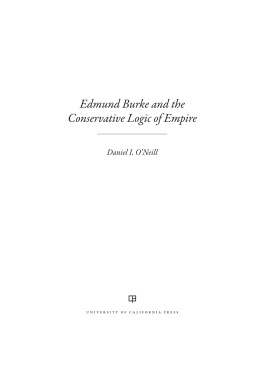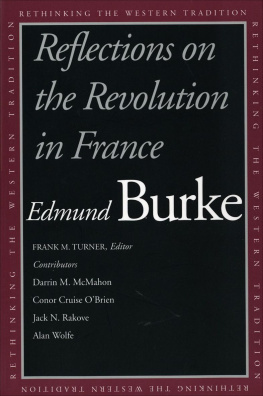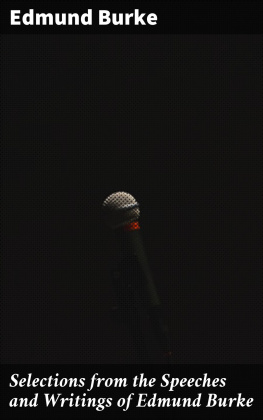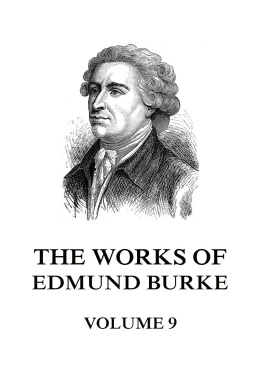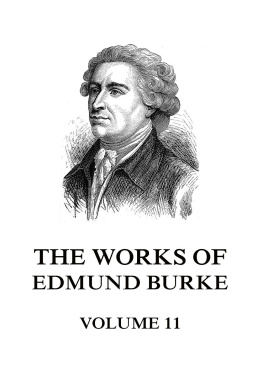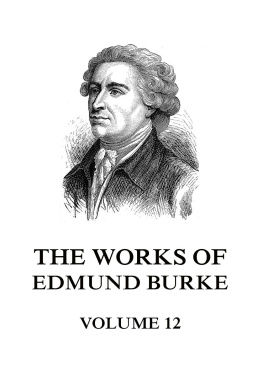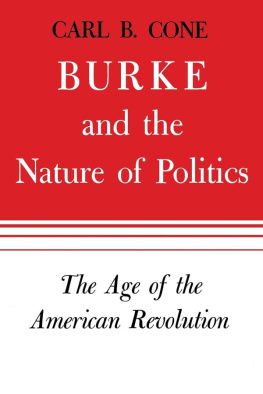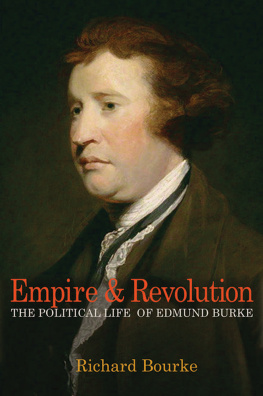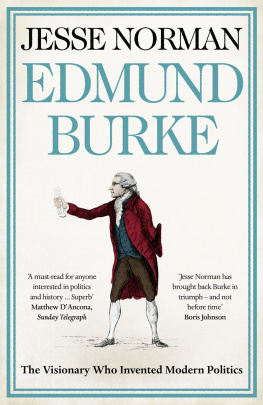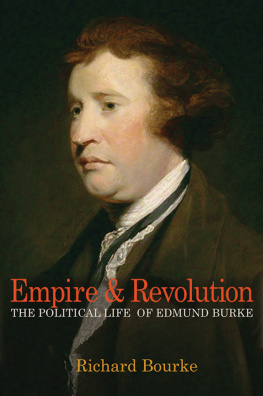EDMUND BURKE
EDMUND
BURKE
THE FIRST
CONSERVATIVE

JESSE NORMAN
BASIC BOOKS
A Member of the Perseus Books Group
New York
Copyright 2013 by Jesse Norman
Published by Basic Books,
A Member of the Perseus Books Group
All rights reserved. No part of this book may be reproduced in any manner whatsoever without written permission except in the case of brief quotations embodied in critical articles and reviews. For information, address Basic Books, 250 West 57th Street, New York, NY 10107.
Books published by Basic Books are available at special discounts for bulk purchases in the United States by corporations, institutions, and other organizations. For more information, please contact the Special Markets Department at the Perseus Books Group, 2300 Chestnut Street, Suite 200, Philadelphia, PA 19103, or call (800) 810-4145, ext. 5000, or e-mail .
Library of Congress Control Number: 2013935334
E-book ISBN: 978-0-465-04494-8
Published in the United Kingdom in 2013 by William Collins
An imprint of HarperCollinsPublishers
10 9 8 7 6 5 4 3 2 1
Contents
EDMUND BURKE IS BOTH the greatest and the most underrated political thinker of the past 300 years. Born in 1730, he came from an extraordinary period in British history, the age of Samuel Johnson, Adam Smith, Edward Gibbon, David Garrick, Joshua Reynolds and David Hume, all of whom were his friends.
Burke was a philosopher-statesman of the first rank, a lifelong campaigner against arbitrary power and injustice, and a fierce champion of fundamental rights and the Anglo-American constitutional tradition. Endlessly lampooned in this, the golden age of caricature, he is nevertheless a figure for the ages. Some understood his greatness at the time: Dr Johnson once remarked that he did not begrudge Burkes being the first man in the House of Commons, for he would be the first man everywhere.
Burke has been all but ignored in recent years, or reduced to a clutch of standard clichs and soundbites. Yet we cannot understand the defects of the modern world today, or modern politics, without him. He is the first great theorist of political parties and representative government, and the first great modern theorist of totalitarian thought. More widely, he offers a compelling critique of what has become known as liberal individualism, and the idea that human well-being is just a matter of satisfying individual wants. To this he joins a perspective with profound implications for many issues now facing policymakers across the globe, including the rise of religious extremism and terror, the atomization of society and loss of social cohesion, the emergence of the corporate state, challenges to the international rule of law, and the nature of revolution itself.
Over his long career Burke fought five great political battles: for more equal treatment of Catholics in Ireland; against British oppression of the thirteen American colonies; for constitutional restraints on executive power and royal patronage; against the corporate power of the East India Company in India; and most famously, against the influence and dogma of the French revolution. Their common theme the inspiration for what W. B. Yeats described in his poem The Seven Sages as Burkes Great Melody is his detestation of injustice and the abuse of power.
In these battles his record of practical achievement was mixed. He often overreached himself, he rarely exercised real political power, and he was variously denounced as vainglorious, a blowhard and an irrelevance. His private life was blighted by debt, which he was unwilling to relieve by the means of self-enrichment usual for the time. He offended King George III by his severe criticisms of royal influence, and by his support for a regency during the Kings period of madness. A man of enormous personal warmth and good humour, he lost friends and supporters by his near-obsessive insistence on the campaigns of the moment.
Yet in intellectual terms the extraordinary fact is not that Burke was occasionally wrong, but that he was so often right. Not only that, he was right for the right reasons not through luck but because his powers of analysis, imagination and empathy gave him an extraordinary gift of prophecy. Thus he anticipated many of the effects of British rule in Ireland; the loss of the American colonies; the overreach of the East India Company; and the disastrous consequences of revolution in France. Modern conceptions of social capital and human well-being have their proper place within his thought, and his vision of community, free institutions and civic virtue still has profound and unrecognized implications for politicians today. Lord Randolph Churchill, father of Winston, once summarized Disraelis life as Failure, failure, failure, partial success, renewed failure, ultimate and complete triumph. The same might be said of Edmund Burke.
There are many reasons for the recent neglect of Burke. He is not an executive politician, like a Pitt or a Peel, and his story is more one of intellect and imagination than of political achievement. His thought is multifarious and scattered across a vast array of pamphlets, speeches and letters, from which it must be quarried by the patient scholar. He is a master of English prose but remains somewhat alienated from current literary or academic debates, in part because he was a working politician, and so perhaps a victim of the distaste that politics often inspires. And he deliberately withholds himself: as he wrote at the age of sixteen to his best friend Richard Shackleton, We live in a world in which everyone is on the catch, and the only way to be safe is to be silent, silent in any affair of consequence, and I think it would not be a bad rule for every man to keep within what he thinks of others, of himself, and of his own affairs. Burkes speeches, his writings and even his letters are notably short on confidences, gossip or personal colour. This is far removed from the modern confessional style.
Moreover, although few more quotable writers have ever existed, Burke himself and his ideas resist brief summary. Even sympathetic readers have seen him as an enigma or a contradiction. They have struggled to understand how he could be both a supporter of the American colonists and a critic of the French revolution; how he could staunchly argue for the established order, yet defend dissenters and Catholics and alienate the Crown; how he could both dismiss abstract rights and insist upon the importance of rights within the rule of law.
For their part, his many critics have accused him of incoherence, hypocrisy, even madness. In particular, for Thomas Paine, and then Karl Marx, Burke is a placeman, a paid propagandist and an apologist for aristocracy and privilege. Such claims were echoed in the twentieth century by the influential historian Lewis Namier and his followers, who generally took a narrow and cynical view of Burkes achievements as a thinker and statesman. Even today, it is striking how much the philosopher Alasdair MacIntyre, for example, owes intellectually to Burke, even while he belittles Burkes ideas. Those who attend to Burkes life often detect inconsistency, because they ignore the deeper consistency of his thought.
But on the other side of the argument such has been Burkes status, especially among conservatives, that his life has regularly been co-opted for political purposes. In the 1830s Disraeli claimed to identify a Tory line of succession including Burke and culminating by implication in himself, only to exclude Burke (and Peel) after he was refused office by Peel in 1841. In the USA, Presidents Woodrow Wilson and Theodore Roosevelt were happy to count Burke their ally, as did a generation of anti-communists during the Cold War and again after the fall of the Iron Curtain. And at a far less exalted level, one way to read the present book is as a modern
Next page

